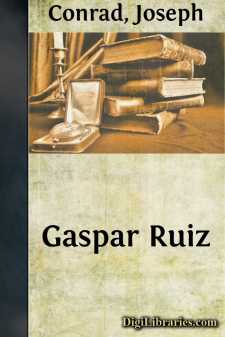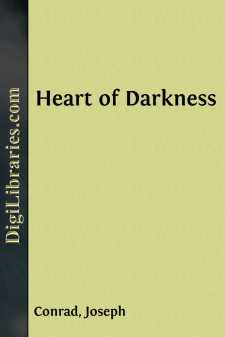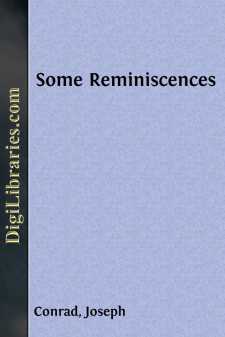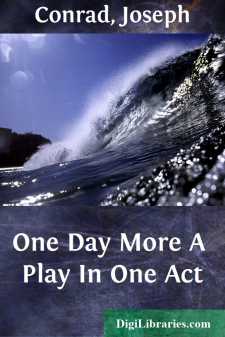Categories
- Antiques & Collectibles 13
- Architecture 36
- Art 48
- Bibles 22
- Biography & Autobiography 813
- Body, Mind & Spirit 142
- Business & Economics 28
- Children's Books 17
- Children's Fiction 14
- Computers 4
- Cooking 94
- Crafts & Hobbies 4
- Drama 346
- Education 46
- Family & Relationships 57
- Fiction 11829
- Games 19
- Gardening 17
- Health & Fitness 34
- History 1377
- House & Home 1
- Humor 147
- Juvenile Fiction 1873
- Juvenile Nonfiction 202
- Language Arts & Disciplines 88
- Law 16
- Literary Collections 686
- Literary Criticism 179
- Mathematics 13
- Medical 41
- Music 40
- Nature 179
- Non-Classifiable 1768
- Performing Arts 7
- Periodicals 1453
- Philosophy 64
- Photography 2
- Poetry 896
- Political Science 203
- Psychology 42
- Reference 154
- Religion 513
- Science 126
- Self-Help 84
- Social Science 81
- Sports & Recreation 34
- Study Aids 3
- Technology & Engineering 59
- Transportation 23
- Travel 463
- True Crime 29
Joseph Conrad
Joseph Conrad, born Józef Teodor Konrad Korzeniowski in 1857 in Poland, was a prominent British novelist known for his rich narrative style and profound exploration of the human psyche. His most famous works, such as "Heart of Darkness" and "Lord Jim," delve into themes of colonialism, morality, and existentialism. Despite English being his third language, Conrad's mastery of the language and innovative literary techniques have cemented his legacy as a central figure in modern literature.
Author's Books:
Sort by:
by:
Joseph Conrad
I A Revolutionary war raises many strange characters out of the obscurity which is the common lot of humble lives in an undisturbed state of society. Certain individualities grow into fame through their vices and their virtues, or simply by their actions, which may have a temporary importance; and then they become forgotten. The names of a few leaders alone survive the end of armed strife and are...
more...
by:
Joseph Conrad
CHAPTER ONE To yesterday and to to-day I say my polite "vaya usted con Dios." What are these days to me? But that far-off day of my romance, when from between the blue and white bales in Don Ramon's darkened storeroom, at Kingston, I saw the door open before the figure of an old man with the tired, long, white face, that day I am not likely to forget. I remember the chilly smell of the...
more...
by:
Joseph Conrad
I The Nellie, a cruising yawl, swung to her anchor without a flutter of the sails, and was at rest. The flood had made, the wind was nearly calm, and being bound down the river, the only thing for it was to come to and wait for the turn of the tide. The sea-reach of the Thames stretched before us like the beginning of an interminable waterway. In the offing the sea and the sky were welded together...
more...
by:
Joseph Conrad
ALMAYER'S FOLLY I am informed that in criticizing that literature which preys on strange people and prowls in far-off countries, under the shade of palms, in the unsheltered glare of sunbeaten beaches, amongst honest cannibals and the more sophisticated pioneers of our glorious virtues, a lady—distinguished in the world of letters—summed up her disapproval of it by saying that the tales it...
more...
by:
Joseph Conrad
A FAMILIAR PREFACE As a general rule we do not want much encouragement to talk about ourselves; yet this little book is the result of a friendly suggestion, and even of a little friendly pressure. I defended myself with some spirit; but, with characteristic tenacity, the friendly voice insisted, "You know, you really must." It was not an argument, but I submitted at once. If one must! . . . You...
more...
by:
Joseph Conrad
I. “I have not read this author’s books, and if I have read them I have forgotten what they were about.” These words are reported as having been uttered in our midst not a hundred years ago, publicly, from the seat of justice, by a civic magistrate. The words of our municipal rulers have a solemnity and importance far above the words of other mortals, because our municipal rulers more than any...
more...
by:
Joseph Conrad
Chapter I. Books may be written in all sorts of places. Verbal inspiration may enter the berth of a mariner on board a ship frozen fast in a river in the middle of a town; and since saints are supposed to look benignantly on humble believers, I indulge in the pleasant fancy that the shade of old Flaubert—who imagined himself to be (amongst other things) a descendant of Vikings—might have hovered...
more...
by:
Joseph Conrad
CHAPTER I. “Kaspar! Makan!” The well-known shrill voice startled Almayer from his dream of splendid future into the unpleasant realities of the present hour. An unpleasant voice too. He had heard it for many years, and with every year he liked it less. No matter; there would be an end to all this soon. He shuffled uneasily, but took no further notice of the call. Leaning with both his...
more...
by:
Joseph Conrad
ONE DAY MORE SCENE I. CURTAIN RISES DISCLOSING CARVIL and Bessie moving away from sea-wall. Bessie about twenty-five. Black dress; black straw hat. A lot of mahogany-coloured hair loosely done up. Pale face. Full figure. Very quiet. Carvil, blind, unwieldy. Reddish whiskers; slow, deep voice produced without effort. Immovable, big face. Carvil (Hanging heavily on Bessie's arm). Careful! Go slow!...
more...
by:
Joseph Conrad
I For a long time after the course of the steamer Sofala had been altered for the land, the low swampy coast had retained its appearance of a mere smudge of darkness beyond a belt of glitter. The sunrays seemed to fall violently upon the calm sea—seemed to shatter themselves upon an adamantine surface into sparkling dust, into a dazzling vapor of light that blinded the eye and wearied the brain with...
more...











